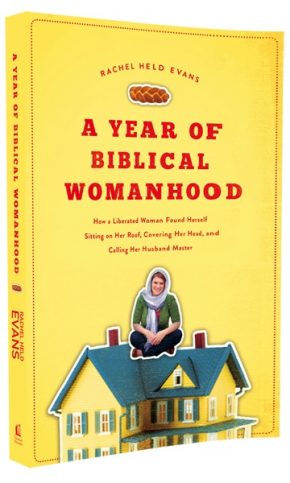 Popular blogger, author, and speaker Rachel Held Evans has added a woman’s touch to the “Year in the life of” genre of books. Following the footsteps of A.J. Jacobs’ The Year of Living Biblically and Ed Dobson’s The Year of Living like Jesus, Evans took on flowing skirts and headscarves for her new release, A Year of Biblical Womanhood.
Popular blogger, author, and speaker Rachel Held Evans has added a woman’s touch to the “Year in the life of” genre of books. Following the footsteps of A.J. Jacobs’ The Year of Living Biblically and Ed Dobson’s The Year of Living like Jesus, Evans took on flowing skirts and headscarves for her new release, A Year of Biblical Womanhood.
“I think all women can relate to feeling like they’re falling short of some sort of ideal,” explains Evans in an appearance on The Today Show. “Growing up in the conservative evangelical subculture, that ideal for me had always been biblical womanhood.”
Her experiment included knitting, baking, child-rearing (involving a computerized baby as Evans doesn’t have kids), calling her husband “master” (not as much of a turn on as anticipated, he confides), and sitting on a corner of the roof as penance for gossiping—among many other new practices.
Unsurprisingly, both Evans and husband Dan were glad when the year was over. The more traditional gender roles changed their relationship from the partnership of their previous seven years of marriage. Despite the obvious perks, Dan says it was difficult to see his wife constantly waiting on him. But it wasn’t just the cooking and cleaning that wore on Evans. “I was really happy when the year was over. The first thing I did was cut my hair.”
Some critics consider her work a mockery of the Bible; and indeed everything from the sewing to the outdoor tenting during her period could reinforce opinions of the Bible as outmoded and patriarchal. She’s also received criticism for using the word “vagina” in her account. She believes this is why her book is banned by a major Christian bookseller.
Characteristic of what makes her popular in the blogosphere, Evans is not afraid of controversy. Instead of avoiding the gender stereotypes that make Christianity unpopular, she tackles them directly, trying to discern which are meant to be taken literally, and which are culturally infused. Her year of literalism is intended to show that the Bible and womanhood are complex, and that not even devout proponents of “biblical womanhood” are really fulfilling all its precepts.
“As a person of faith I love the Bible and I hate seeing it reduced to an adjective,” she says on Today. “That’s why I did this.”